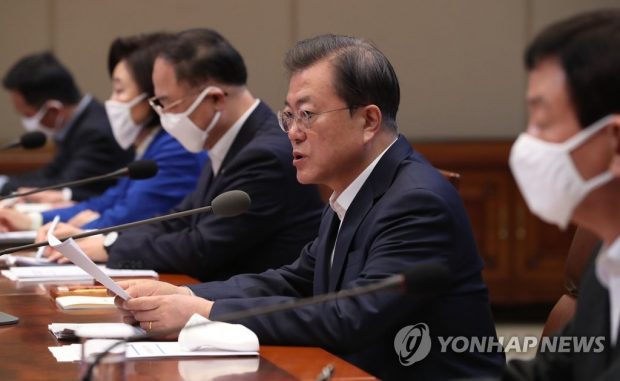
35 million South Koreans to benefit from ‘disaster relief money’ for households

SEOUL: The South Korean government will grant “emergency disaster relief money” to a majority of the country’s households in a one-off stimulus program to help with the economic impact of the coronavirus crisis, President Moon Jae-in said Monday.
He also unveiled a plan to seek another supplementary budget during a third session of the emergency economic council at the presidential office Cheong Wa Dae.
“The government has decided to pay emergency disaster relief money” directly to South Koreans struggling to make ends meet due to the pandemic, he said.
Under the scheme, 1 million won (US$820) would be given to a four-person household, of which gross income stays at or below 70 percent of the total. It represents an earnings limit for the aid program, meaning individuals with relatively low income would get paid in accordance with the standard. The finance ministry is expected to make relevant details public later in the day.
Around 14 million households comprising 35 million people would be eligible for the aid.
“It was not an easy decision,” he said, stressing that the people deserve “compensation” for their difficulties participating in the monthslong social distancing and quarantine-related steps.
To finance the aid program, Moon said the government will push for a “second” extra budget, with the aim of getting the bill passed at the National Assembly shortly after the April 15 general elections.
This suggests that beneficiaries would receive the relief money following the handling of another extra budget bill. Lawmakers have already approved an 11.7 trillion-won supplementary budget plan over the coronavirus.
The president also said his administration would relieve the burden on low-income families, small-shop owners and the self-employed for fees for the four social insurances and electricity use. The four are health insurance, national pension, employment insurance and industrial accident compensation insurance.
They will get reductions in such fees or be allowed to postpone monthly payments.
Moon added the measures would take effect immediately, affecting fees in March first, without elaborating.
“(We are) facing a difficult situation right now, but the future is uncertain as well,” Moon said, calling for “long-term” preparations to pass through the “dark tunnel” and help the economy to recover.
Earlier this month, Moon launched the council to make quick policy decisions and take action to minimize the economic fallout of COVID-19.
In the two previous sessions, he approved a set of emergency measures, including 100 trillion won of financial support for the business sector, amid concerns about credit and liquidity crunches.
YONHAP


